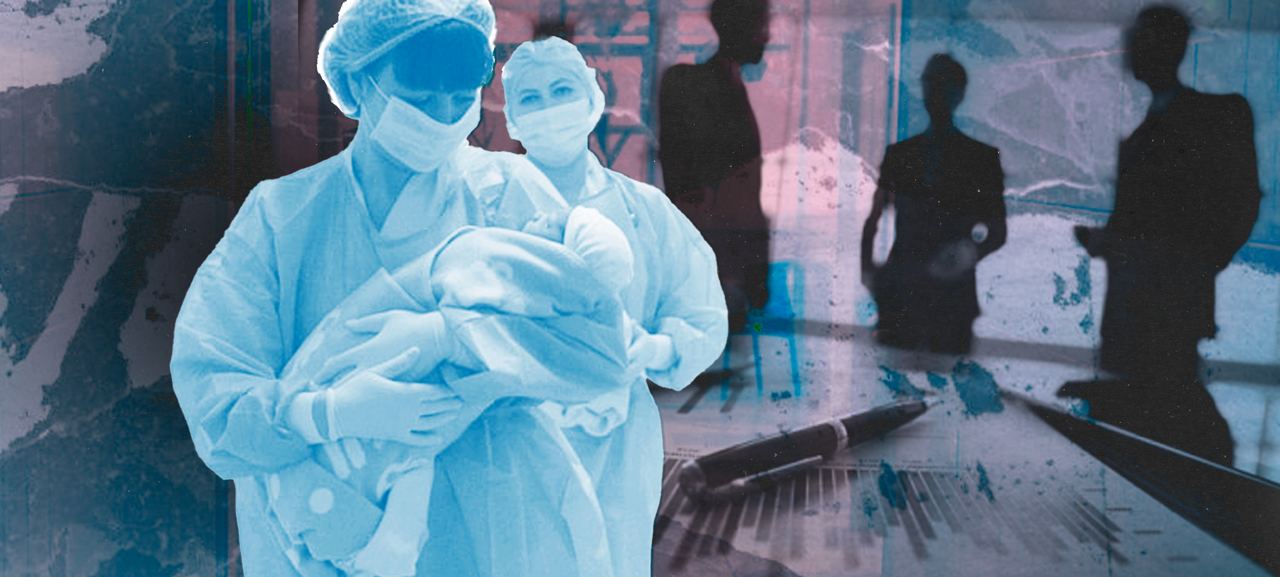During the last few years, there have been two major shakeups in the Ukrainian healthcare system: COVID-19 and the full-scale Russian invasion. Both of these events have increased the demand for healthcare medical staff, as has increased the real risk to their lives. And yet, the majority of healthcare workers in Ukraine are nurses. According to the data available within the framework of the Be Like Nina study of the nurses' movement, as well as the analysis of changes in Ukrainian legislation, these two large-scale challenges have had different impacts on nurses' labour rights. While in the case of the COVID-19, there was significant attention to the problems of the healthcare sector along with changes in favour of nurses, in the case of the war, there was a setback. Perhaps, it is also related to the general narrowing of labour rights in the context of "anti-crisis" deregulation. Still, it is also important to note the ambivalent nature of the role of nurses, which encompasses both care and medical assistance. According to researchers Julie A. Nelson and Nancy Folbre, nurses often have to confront the perception of themselves as "kind 'angels'" or "pillow-fluffers" rather than true medical staff. And the comparison of the challenges of the pandemic and the war shows well how this ambivalence changes their bargaining power – the ability to fight for better working conditions.
"What kind of a reform is it that healthcare medical staff don't have masks?"
There was the establishment of the Be Like Nina movement, which advocates for the rights of Ukrainian nurses, the implementation of the key elements of the healthcare reform, and the outbreak of the COVID-19 pandemic, which actually coincided in time. Therefore, the nurses managed to take advantage of this temporal coincidence along with the significant media attention to the medical sector. There were hospital protests across the country in response to staff reductions and salary cuts as a result of the healthcare reform, and in response to problems with providing healthcare workers with COVID-19 personal protective equipment, etc.
In February 2020, Be Like Nina activists organised a protest with slogans against the healthcare reform. Later in the spring, after the reform took effect and led to predictable salary cuts, local protests took place at the country's key medical institutions, such as the Kyiv Diagnostic Centre, the largest psychiatric clinic, and the Lviv Centre of Emergency Medical Care. A few heads of hospitals went on hunger strike.
Over time, the reasons for dissatisfaction included inadequate supply of COVID-19 protection equipment and the non-existence of the promised "quarantine" payments. Medical staff began posting on Facebook screenshots showing the amount of money they received on their salary cards. A similar information was collected on the Facebook group "Be Like Nina".
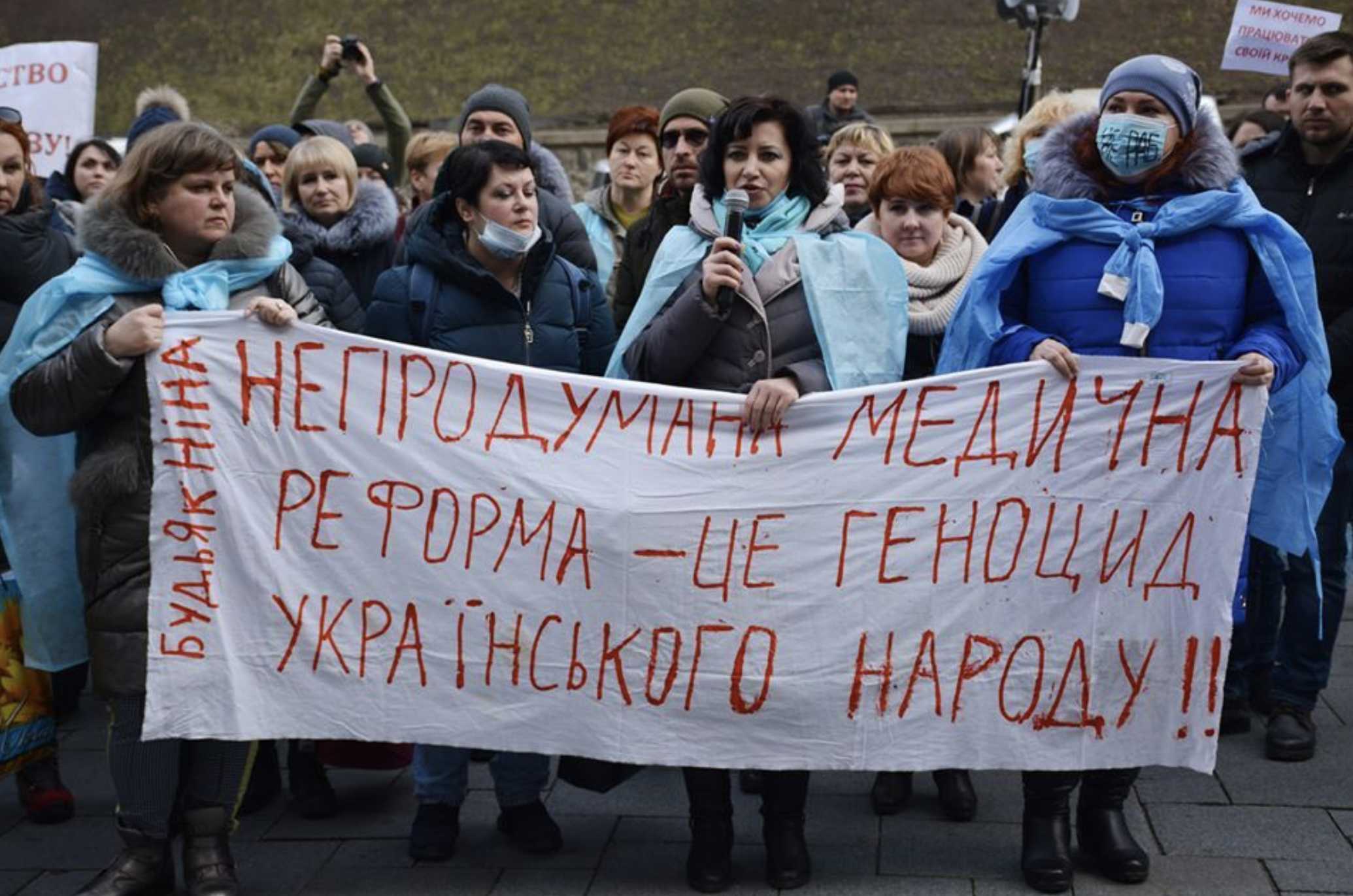
Be Like Nina action on 26 February 2020 in Kyiv. Photo: Politkrytyka
The movement's co-founder, 42-year-old nurse Yuliia (name changed), says it was a time when medical staff were no longer afraid to speak out publicly about their dissatisfaction, while the media were ready to listen to them.
"This particular pandemic has brought to the surface all the flaws and wounds of the medical industry. This includes the problems related to the material and technical base, staff shortages, disrespect for staff and patients. Thanks to the efforts of patients, doctors, and the press, it has become impossible to cover up many things any longer."
For this activist, the pandemic was a moment when her knowledge was neglected because she was "just a nurse who should know where she belongs".
"When the COVID pandemic first broke out, a girl was admitted to our hospital. At that time, I was attending an international medical conference and had some great information on COVID, which I came to share. I said that this child was suffering from the coronavirus disease. Later on, it turned out that I was right. But instead of normal reaction, the doctor started talking: "Why are you referring to these concepts? You know nothing about them!"
As a result of the patient's incorrect diagnosis, Yuliia herself became ill with COVID-19, and later so did the entire hospital department. At the same time, like most Ukrainian healthcare professionals, the nurse did not receive proper insurance compensation for workplace infection, and subsequently was mobbed by the hospital administration so she resigned.
According to Yuliia, local journalists interviewed her about the COVID-19 situation at the hospital, yet presented the information in a highly provocative manner. This, combined with a previous conflict with the management, was the stimulus for her to resign.
"I suffered so many blows afterwards. The chief physician called my husband. This was such a great deal of additional stress. I was extremely uncomfortable, because the pressure was coming from that side too [through family ties]. However, afterwards [the chief physician] called me, and I was no longer afraid."
In the context of the pandemic, there was also the illustrative case of the movement's founder, 50-year-old nurse Nina Kozlovska. She publicly claimed that the chief physician was corrupt, who, according to her, sold medical masks in the hospital's pharmacy, while the staff was forced to "sew their own masks".
"I then went on a video stream [on Facebook] and said: 'What kind of reform is this, that doctors don't have masks'? The next day, the rayon commission arrived. I was at home, so the girls called me and said: "Nina, you have absolutely no idea what's going on! They are bringing entire packages of masks to the pharmacy [of the hospital]." I realised that the administration was preparing for the commission. After that, the chief physician started taking revenge on me."
She was mobbed and transferred to a lower-paid position before eventually leaving to work in a private clinic. Ultimately, such experiences hardened the nurses' desire not to return to the previous corrupt and hierarchical system, while also demonstrating the inability of the new system to cope with the challenges of the pandemic and control the activities of unscrupulous chief physicians.
Since such cases, especially Nina's case, became public, it attracted the attention of many other nurses who could relate to the movement's leaders. However, they mostly avoided taking any active action, as mobbing and loss of jobs were the outcomes of these cases.
At the same time, there have been positive changes for medical staff at the country level. In the second year of the pandemic, salaries for both doctors and nurses in Ukraine were significantly raised. Since January 2022, they have in fact doubled. And although activists do not directly say that they are responsible for this, such an opinion exists among them. For example, one of the movement's co-founders, 35-year-old nurse Anna, notes: "COVID-19 contributed to the increase in salaries. But we have addressed this matter before."
Therefore, in addition to the undoubted media success of the Be Like Nina movement, the specific conditions created by the pandemic also affected the level of salaries. It is these conditions that have increased the bargaining power of doctors and their ability to influence working conditions. For instance, during COVID-19, care for patients could not be delegated to relatives or other individuals, since patients were isolated. Consequently, there was no one but medical staff who could have access to them and take care of them. This contributed to the advocacy of the interests of medical staff, both in Ukraine and abroad.
"The war has cut off the way to struggle"
It was a month after the increase in medical staff salaries that the full-scale war broke out, creating chaos at first, especially in the areas affected by the hostilities. Some hospitals and their medical staff ended up under occupation, were subjected to shelling or destruction: after two years of war, more than 1,500 facilities were damaged, 195 were destroyed, and about 200 civilian medical staff perished. At the same time, the medical staff of some medical institutions fled en masse to save themselves and their loved ones. Vita (name changed), a 49-year-old nurse from Kyiv who is raising two teenagers by herself, described how she went to work during the Russian offensive on the capital.
"We would leave for four days. I was on duty for four days, and then it was another nurse. However, she has no family, no children. And I have two kids who stayed with my mother-in-law pretty much in the line of fire, because I live on the outskirts of Kyiv, right where the attack was, not far from Irpin. So, while I was working for four consecutive days, my mother-in-law stayed in a bomb shelter with the children."
This was a common situation at the beginning of the war, and those who kept working often motivated their decision by a sense of duty. It also links to the concept of "prisoners of love" (England 2005), where care workers refuse to strike or take any other action that might harm their recipients. In the context of Ukraine, however, this was exaggerated, with some employees risking their lives rather than working in a poorer environment.
However, after the first months of shock, most hospitals returned to their normal operating procedures. According to nurse Yuliia, air raid sirens are mostly ignored by the staff.
"The medical professionals have been trained to go down to the basement in case of an air raid sirens. But it's merely a recommendation: as if you could, as if you couldn't. In reality, it is strongly discouraged, no one goes [to the shelter] because everyone would make fun of them."
As a result, the labour of civilian healthcare workers does not appear to be much more dangerous than that of rescuers, power engineers or employees of the defence industry. This situation is significantly different from that of the pandemic.
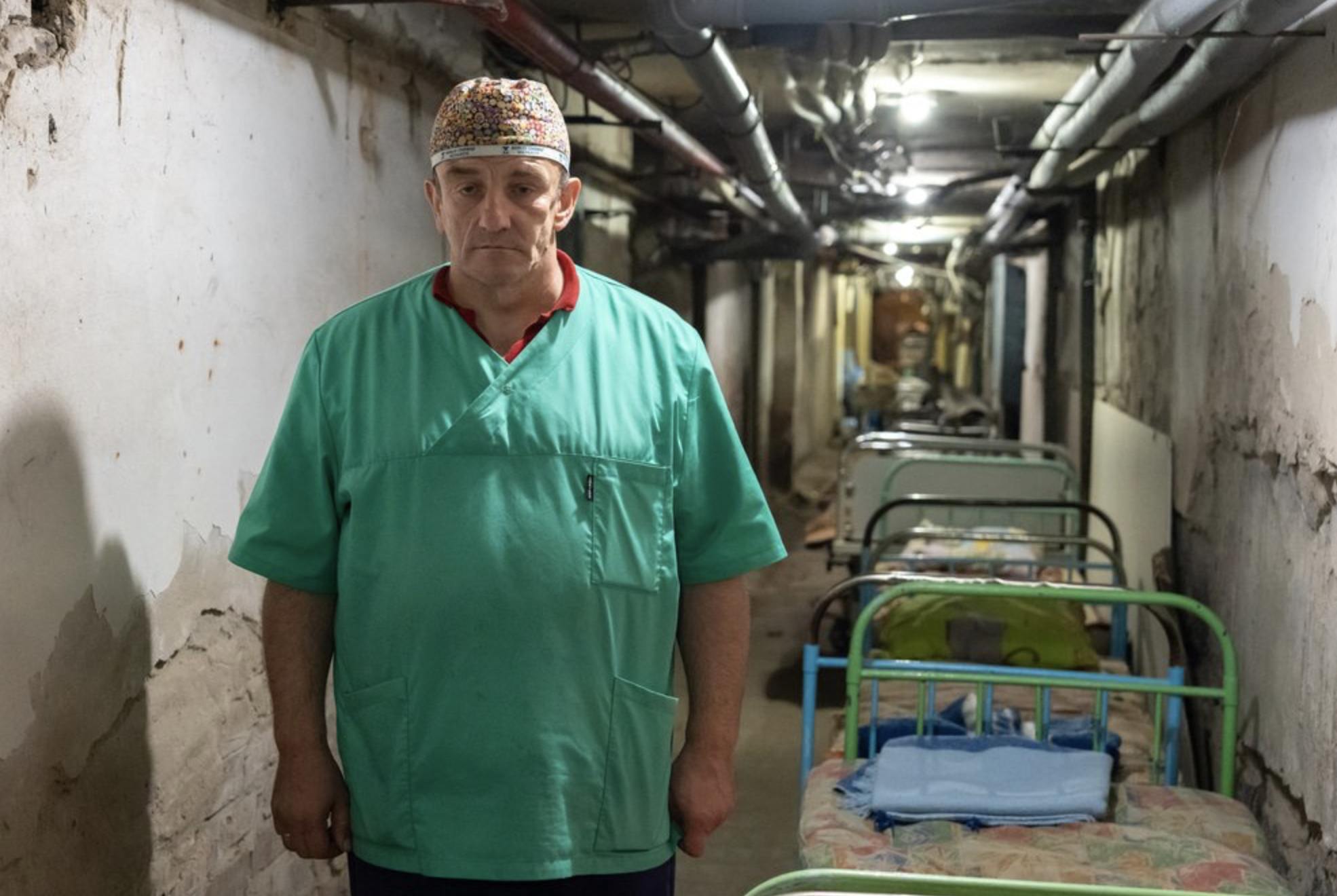
Traumatologist Yurii Kuznetsov, standing in the basement of a hospital in Izyum, where 72 patients were treated. Photo: texty.org.ua
This has also been reflected in Ukrainian legislation. On January 13, 2023, the Government of Ukraine passed the Resolution No. 28 "On Certain Issues of Payroll of Employees of State and Municipal Healthcare Institutions", which allows hospitals to reduce personnel salaries to the minimum wage if the hospital's payroll expenses exceed 85%. A number of monetary rewards were also cancelled. Instead, the government has increased the salaries of civilian healthcare workers in the frontline areas, which, depending on the region, amounts to a raise in the amount of UAH 5,500 or 2,000.
Nina, the founder of the nurses' movement, believes that they currently have limited opportunities to defend their rights:
"The war has cut off the way to struggle. Of course, the main concern now is the frontline, the military. And we understand that it is somehow wrong to speak out. Although it's necessary, since despite the war, healthcare professionals need to be paid."
The activists feel that now, when compared to the pandemic time, their right to fight for better working conditions is losing legitimacy from the perspective of society. However, they insist on the importance of their work as crucial to the existence of society.
As for the authorities' attitude, the case of last year, when the representatives of the Ministry of Health were rather rude to Be Like Nina activists who wanted to meet with the Minister, is illustrative. Additionally, according to the co-founder of Be Like Nina, 61-year-old medical doctor Oleh (name changed), the Ministry of Health is abandoning its regulatory agency in the field of the working conditions of healthcare workers after reform and decentralisation has been implemented. Recently, the activists met with a representative of the parliamentary healthcare committee, Mykhailo Radutskyi. However, as Oleh notes, following the conversation, they had the impression that: "neither the Ministry of Health, nor he personally, nor any other top-level functionary formally can do nothing, because it is the communities and their appointed chief physician who are responsible for the fate of medical staff."
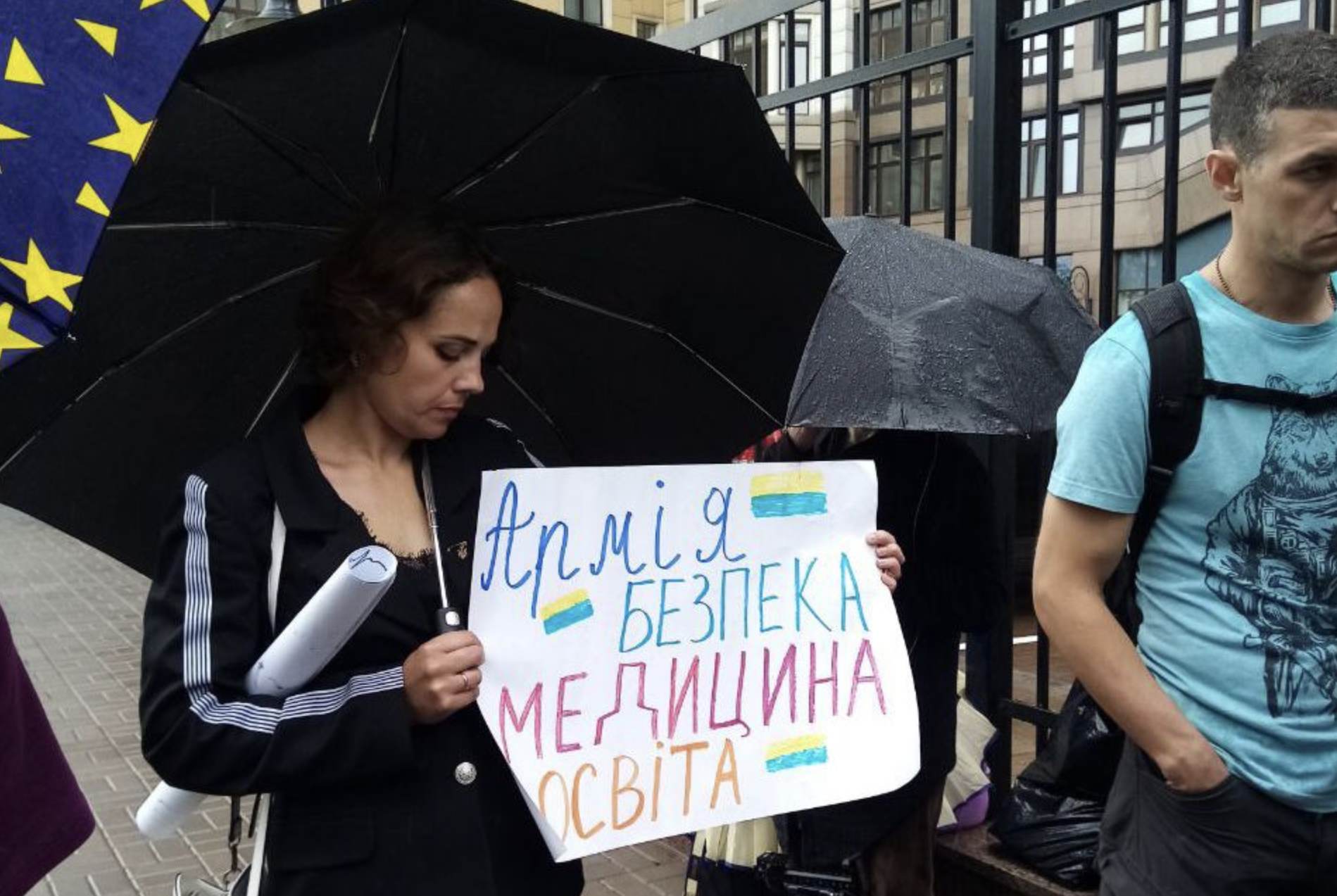
Be Like Nina activists' campaign near the Ministry of Health, Kyiv, July 2023. Photo: medryh.com.ua
Such consequences of healthcare reform and decentralisation, as well as the refocusing of society and the government due to military threats, have affected the situation in which civilian healthcare workers find themselves. The main characters in the media are combat medics who work at the most dangerous stages on the front line and in stabilisation centres. They are subordinated to the Ministry of Defence and their salaries are significantly higher – for obvious reasons. However, the importance of civilian medical staff for society – both in peacetime and in war – remains, as does the problem of chronically low, often minimal, salaries in the sector.
Care delegation
Apart from a number of reforms, a shift in public and governmental attention, and the risks that war poses to all civilians, not just medical staff, there is another reason why it is now harder for nurses to advocate for their interests. While during the pandemic only medical personnel could provide care to patients, at present, some of the care of wounded soldiers can be delegated to relatives.
This can be perceived as normal by both society and nurses themselves. According to researchers at the Pryncyp Human Rights Centre for the Military, relatives are "often responsible for the entire range of needs of the injured or ill: physical care, emotional care, treatment control, search for specialists and hospitals, and communication". Apart from the fact that such unprofessional assistance might be of poor quality, it is generally inaccessible for those soldiers who do not have the support of relatives. In general, the situation leads to less dependence on nurses when it comes to caring for the wounded.
Such practices were also common before the pandemic, when the problem of staff shortages was solved not by increasing the number of nurses, but by involving relatives in care. According to nurse Hanna, who currently works in the United States, this could have negative consequences.
"A great number of post-stroke patients die during the first year afterwards because relatives don't know how one should take care of them, when family doctors cannot handle the workload. In the US, a nurse is provided to the patient, so that a sick relative in your family will not affect your work. In Ukraine, this is a disaster."
According to her, the constant deficiency of nurses in the United States, despite the active involvement of migrants and large investments in training, is due to the much higher standards of medical care compared to those in Ukraine.
"The US system does not keep up with graduating so many specialists. The nation is aging, medicine is advanced, and the requirements are different. If in our department there is one nurse for 30 patients, in the US there will be five nurses for 30 patients."
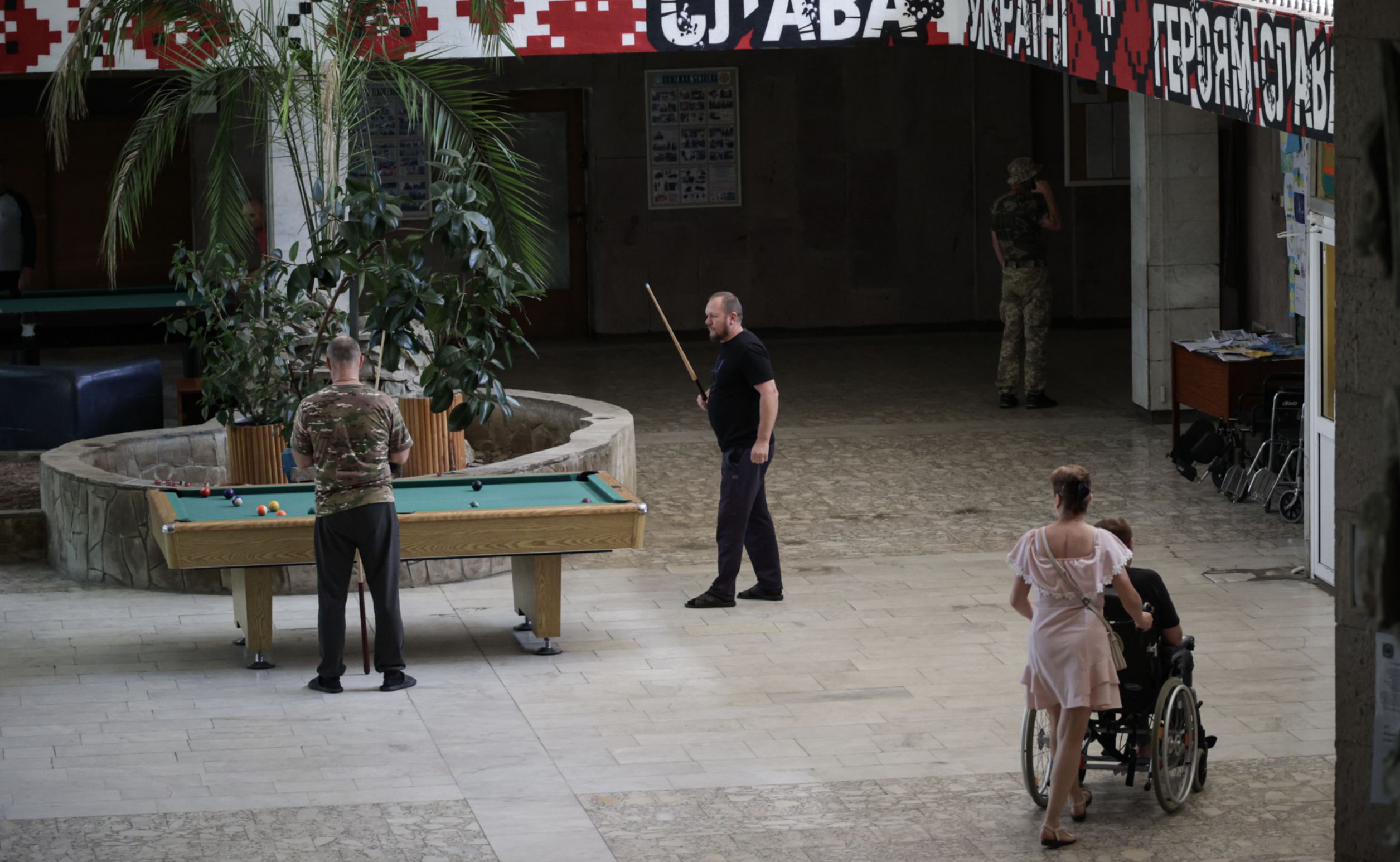
The main hall of the Lisova Polyana Centre for Mental Health and Rehabilitation, Pushcha-Vodytsia, Kyiv, summer 2023. Photo: Danylo.Dubchak
The shortage of specialists and the inability of Ukrainian nurses to fully perform their duties without the help of patients or their relatives can also be illustrated by the fact that hospitals often lack proper security. For example, Nina shared the following incidents:
"The security guard was only at the reception desk, but when a fight starts, where do you run to? You are the one trying to calm down the aggressor so that he doesn't hit the patients. […] There was an incident when I was pregnant. My baby bump was already big. And a fight started. And I was kicked so hard in the stomach […]. Another four years ago, there was a strong patient, about two metres tall, who started throwing chairs around. And next to him were three sick patients. A nurse and I [grabbed him] by the arms, and he shoved us away. But there was a male patient who could walk, so he came to help."
All of this undoubtedly affects the emotional state of Ukrainian nurses, their over-exploitation and, ultimately, the quality of medical care. However, in the end, a complete care disaster is avoided thanks to the involvement of patients' relatives. Paradoxically, this leads to the fact that the authorities have fewer incentives to improve the situation of nurses compared to before the pandemic.
An indirect indication of this is the fact that citizens with medical education have not been banned from leaving Ukraine, although discussions on this matter began as early as the risk of a Russian invasion in 2021. There is no evidence that there are disproportionately more nurses among Ukrainian refugees. Instead, statistics show that people from large cities and industrial regions with a high level of education and, probably, a certain "financial safety net" have left Ukraine. Considering the low salaries, nurses are less likely to fall into this category. Besides, the aforementioned concept of "prisoners of love" may have influenced the decision of some of them whether to leave or stay.
***
During the COVID-19 pandemic, some victories were won and progress was made in the fight against the devaluation of nurses' work. A significant part of these achievements is directly or indirectly related to the activity of the Be Like Nina movement.
That said, it was a pandemic that created unique conditions where only medical staff could care for patients, and they were the only ones who risked their lives. One of the key factors that contributed to the successful advocacy of medical staff during the pandemic was the inability to delegate some of the care responsibilities to relatives of patients. Currently, in Ukraine, combat medics are partly in similar positions, who, for those and other understandable reasons, are the ones who receive the most recognition from the government and society.
The very specific situation in Ukraine, moving dramatically from one extraordinary shock to another, has shown that, although nurses' work is essential for society, it is the ability to use unpaid care work instead of paid ones that helps to solve the "care crisis" without improving working conditions in the healthcare sector. This demonstrates the ambivalent position in which nurses find themselves: their paid care work is replaced by unpaid care from family members whenever possible.
That solution leads to an exacerbation of gender inequality, as women are the ones who provide unpaid care, and thus the crisis is being "solved" at the cost of their resources. Besides, it carries risks for patients since such unpaid care is not professional. As a result, this allows the authorities to postpone indefinitely the solution of chronic, often critical problems in the healthcare sector in Ukraine, in particular those related to working conditions and wages.

